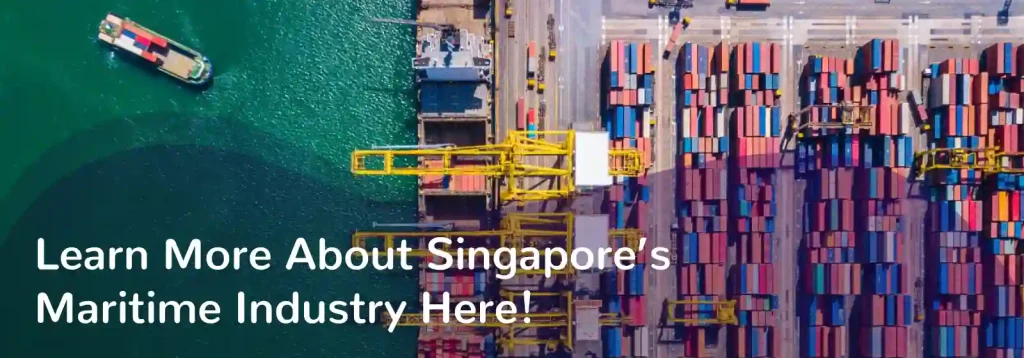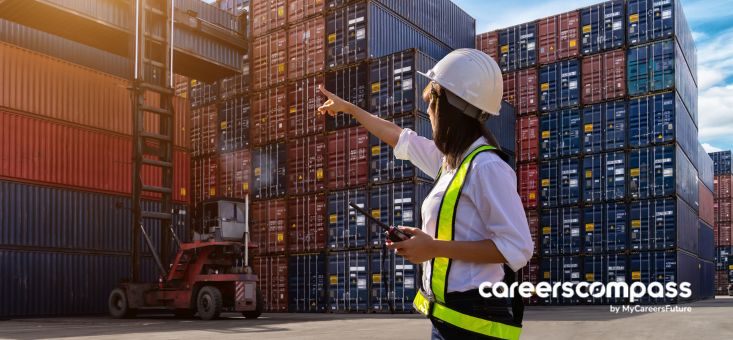Questions about the maritime industry answered
- What is the Singapore maritime industry?
- Is the maritime industry stable if you’re considering a mid-career switch?
- What kind of jobs are there in the maritime industry?
- What’s the salary like?
- What are the growth areas in the maritime industry?
- What courses or skills are needed to join the maritime industry?
About Singapore’s maritime sector
Maritime is steeped in the lifeblood of Singapore, and can be traced back to our beginnings as an entrepot trade hub.
Today, with sea transport being an indispensable driving force for the world economy and international trade, Singapore has become one of the world’s leading maritime nations and a vital node within the global supply chain network.
Our global hub port is an icon of Singapore’s economic vitality and a critical component of Singapore’s connectivity.
Singapore has world-class resources in ports, logistics, law, ship management and seafarer training, and has led the world’s maritime cities in annual rankings for five years running.
It was revealed during Singapore Maritime Week in 2024 that the DNV-Menon Leading Maritime Cities report put Singapore in the top spot once again, followed by Rotterdam, London and Shanghai.
Size of the job market
As one of the world’s leading maritime centres, Singapore’s maritime sector provides employment opportunities in a wide range of maritime careers, attracting talented individuals to navigate the unique and ever-changing environment. Beyond sea-based jobs such as harbour pilots and seafarers, the maritime sector offers shore-based roles in automation, robotics, data analytics, engineering, sustainability, legal and finance as well.
Why is this sector important to Singapore’s economy?
According to the Maritime and Port Authority of Singapore (MPA), total business spending by key maritime companies overseen by MPA exceeded S$4.8 billion in 2023, up from S$4.3 billion in 2022.
In the bustling maritime hub of Singapore, maritime companies are continually establishing or expanding their operations in Singapore, which includes international shipping lines who have established their global/regional headquarters here, maritime services companies, as well as companies setting up sustainability desks in Singapore as part of their decarbonisation strategy and growth plans.
Growth areas and outlook for the maritime sector
Singapore’s maritime sector is a pacesetter for green technology and digitalisation, particularly in green bunkering of LNG and methanol, with plans to add ammonia to the mix.
The MPA also signed a Memorandum of Understanding (MOU) to develop an innovation centre for maritime artificial intelligence (AI) and machine learning with Amazon in 2024, which will enable MPA and companies in the sector to build and test AI solutions, in preparation for the Tuas Port, which is targeted to come fully online in 2040, and will be one of the world’s largest fully-autonomous container port spanning 1,337 ha of land.
Currently, three more berths (which takes the total number of operational berths to eight) have already become operational in 2023 as part of the port’s first phase, which opened officially in 2022.
MPA has also launched pilot trials for electric harbour craft charging points at Marina South Pier in April 2024, with the aim of increasing decarbonisation options for the industry.
By 2030, all new harbour craft must be fully electric, and be able to use cleaner biofuels or net-zero fuels such as hydrogen, as part of a push for net-zero emissions by 2050.
In April 2024, the Maritime International Advisory Panel (IAP) held its third annual meeting in Singapore, and shared the key opportunities for the maritime sector in the following areas:
- Accelerating the green transition towards a low- and zero-carbon future, supported by important enablers such as financing for green shipping.
- Deepening the utilisation of technology and digitalisation while strengthening cyber resilience.
- Training and re-skilling the maritime workforce to take on the new job opportunities of the future.
Mid-career switch: Why is the maritime sector a good choice?
As the global economy becomes increasingly interconnected, business activities relating to port and shipping have grown steadily to facilitate international commerce.
Against this backdrop, job opportunities and employment in the port and shipping sectors have remained robust over the years.
Singapore’s Minister for Transport Chee Hong Tat has said that the goal is to bring into the maritime industry mid-career individuals who bring “useful skills and knowledge from other industries.”
Speaking to the Straits Times, he added: “We will equip mid-career switchers and existing maritime employees who are taking on different roles with new competencies in areas such as automation, data analytics, decarbonisation and cyber security.”
These programmes do work, and an example of a Singaporean that made a successful industry switch is Mr Fok Jin Jin, a 39-year-old senior liquefied natural gas (LNG) technician at LNG bunker supplier FueLNG.
Jin Jin was previously an operation technician at a petroleum company who took part in a career conversion programme for sea transport professionals in 2019.
Having successfully made the switch, he shared: “Due to the structured process and the on-the-job training provided, I found the learning curve all right!”
Types of jobs in the maritime sector
The global and diverse nature of the maritime industry creates jobs for both seafaring and shore-based workers.
Jobseekers interested in international trade and logistics can explore commercial (e.g. ship charters, shipbrokers), operational (e.g. vessel operators, capacity management) or technical (e.g. marine surveyor) roles at shipping companies and maritime service providers.
Those with a love for the sea can consider seafaring roles to see the world, which prepares them for senior shore-based management roles such as marine superintendents or technical superintendents.
Not looking to leave Singapore that much? There are also shore-based roles that require skills in areas such as engineering, operations, business development, info-comm technology, finance, law and human resources.
“Salary-wise, most of these jobs, especially for individuals with a few years of experience, provide wages comparable to or higher than the median in Singapore,” Kenneth revealed.
As for individuals who prefer a more hands-on working environment, the industry has ample opportunities in jobs such as ship agents, port technicians, and port crane operators.
Looking to join the Maritime industry? Explore jobs available in the sector on MyCareersFuture now!
What’s the salary like in the maritime sector?
Jobs in the maritime sector cover a broad spectrum of roles, and salaries do vary depending on the specific job function, level of experience, and qualifications.
Here are some examples listed on the MyCareersFuture portal:
| Role | Salary Range (Monthly) |
| Shipping Documentation Admin | $2,000 to $3,000 |
| Ship Broker | $10,500 to 20,800 |
| Ship Master | $8,500 to $10,500 |
| Shipping Operations | $4,000 to $5,000 |
| General Manager | $7,000 to $12,000 |
| Line Manager | $6,000 to $8,000 |
| Service Engineer | $3,800 to $4,500 |
| Surveyor | $5,000 to $6,000 |
| Digital Solution Personnel | $8,500 to $12,000 |
| IT Engineer | $3,500 to $4,500 |
What courses or skills are needed to join the maritime sector?
Workforce Singapore’s Career Conversion Programme (CCP) for the Sea Transport Sector provides employers with salary support to support new hires and existing employees in taking up new job roles in Port Operations and Services, Shipping, and Maritime Services, and has also been enhanced to allow 100% on-the-job training based on industry partners’ and employees’ feedback.
Jobseekers interested in international trade can explore commercial (e.g., ship charterers, shipbrokers), operational (e.g., vessel operators) or technical (e.g., marine surveyor) roles at sea transport companies and maritime service providers.
The Career Conversion Programme (CCP) for the Sea Transport Sector thus aims to lower the barrier to entry for mid-career individuals as well as existing employees to move into new or enhanced roles in the Sea Transport sector.
The programme provides employers with funding to reskill these individuals, equipping them with skills, knowledge and competencies required for their new or expanded role. Besides the traditional maritime roles, the CCP also covers functions in the growing maritime digitalisation, maritime decarbonisation and maritime cybersecurity space.
Managed by the Singapore Shipping Association (SSA), employers looking to optimise and create higher quality roles for their existing employees can tap on the same programme and funding.
Find out more here:
If you’re looking for more maritime-industry related information, read on below! Find out here if you are looking for a career switch to maritime industry in Singapore!

Career Switching into Maritime: How 2 Singaporeans Did it
How Well Do You Know the Maritime Industry? 3 Maritime Myths Busted















